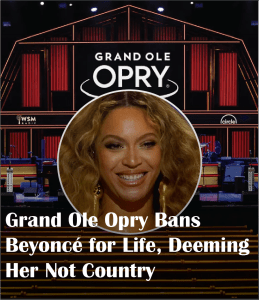In a move that has stirred both debate and contention, the Grand Ole Opry has made the decision to permanently bar Beyoncé from gracing its iconic stage, citing her divergence from traditional country music standards. This announcement has ignited discussions concerning the boundaries of the genre and the significance of diversity within its framework.
Nestled in Nashville, Tennessee, the Grand Ole Opry has stood as a bastion of classic country music, providing a platform for legendary performers and honoring the genre’s storied legacy. However, Beyoncé’s recent ventures into country music have raised eyebrows among Opry officials, who argue that her musical stylings stray too far from the genre’s established norms.

Central to the dispute is Beyoncé’s incorporation of a myriad of musical influences into her country-inspired compositions, notably exemplified by her track “Daddy Lessons” from the album “Lemonade.” While applauded for its innovative fusion of country, blues, and hip-hop elements, the song has also drawn reproach from purists within the country music community.
Proponents of the Grand Ole Opry’s decision assert that safeguarding the purity of country music is imperative for preserving its authenticity and heritage. They perceive Beyoncé’s incursion into the genre as a threat to its traditional identity, fearing it could dilute the essence of country music for future generations.
Conversely, detractors regard the ban as emblematic of gatekeeping and exclusion within the music industry. They advocate for a more inclusive definition of country music, one that embraces diverse influences and perspectives. Beyoncé’s exploration of the genre, they argue, exemplifies its capacity for evolution and adaptation in response to contemporary cultural shifts.
Beyond the specifics of Beyoncé’s ban, the controversy sheds light on broader issues of representation and diversity within the country music sphere. Historically criticized for its lack of inclusivity and marginalization of artists from diverse backgrounds, the genre faces ongoing challenges in fostering a more equitable environment.
While the debate surrounding Beyoncé’s exclusion from the Grand Ole Opry rages on, it serves as a poignant reminder of the delicate balance between tradition and innovation in music. It prompts reflection on how the genre can evolve while still honoring its roots, underscoring the importance of fostering inclusivity and embracing change within the country music landscape.
Leave a Reply